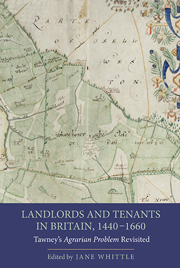Book contents
- Frontmatter
- Contents
- List of Figures
- List of Tables
- Abbreviations
- List of Contributors
- Acknowledgements
- Foreword
- Introduction: Tawney's Agrarian Problem Revisited
- 1 The Agrarian Problem, 1440–1520
- 2 Common Law and Manor Courts: Lords, Copyholders and Doing Justice in Early Tudor England
- 3 Negotiating Enclosure in Sixteenth-Century Yorkshire: The South Cave Dispute, 1530–1536
- 4 The Politics of Enclosure in Elizabethan England: Contesting ‘Neighbourship’ in Chinley (Derbyshire)
- 5 The Loss of Athelstan's Gift: The Politics of Popular Memory in Malmesbury, 1607–1633
- 6 In Search of the Scottish Agrarian Problem
- 7 The Transfer to Leasehold on Durham Cathedral Estate, 1541–1626
- 8 The Financial Rewards of Winning the Battle for Secure Customary Tenure
- 9 Risks and Rewards in Wasteland Enclosure: Lowland Lancashire c.1500–1650
- 10 Improving Landlords or Villains of the Piece? A Case Study of Early Seventeenth-Century Norfolk
- 11 The Agrarian Problem in Revolutionary England
- 12 Agrarian Capitalism and Merchant Capitalism: Tawney, Dobb, Brenner and Beyond
- Conclusions
- Select Bibliography
- Index
10 - Improving Landlords or Villains of the Piece? A Case Study of Early Seventeenth-Century Norfolk
Published online by Cambridge University Press: 05 September 2013
- Frontmatter
- Contents
- List of Figures
- List of Tables
- Abbreviations
- List of Contributors
- Acknowledgements
- Foreword
- Introduction: Tawney's Agrarian Problem Revisited
- 1 The Agrarian Problem, 1440–1520
- 2 Common Law and Manor Courts: Lords, Copyholders and Doing Justice in Early Tudor England
- 3 Negotiating Enclosure in Sixteenth-Century Yorkshire: The South Cave Dispute, 1530–1536
- 4 The Politics of Enclosure in Elizabethan England: Contesting ‘Neighbourship’ in Chinley (Derbyshire)
- 5 The Loss of Athelstan's Gift: The Politics of Popular Memory in Malmesbury, 1607–1633
- 6 In Search of the Scottish Agrarian Problem
- 7 The Transfer to Leasehold on Durham Cathedral Estate, 1541–1626
- 8 The Financial Rewards of Winning the Battle for Secure Customary Tenure
- 9 Risks and Rewards in Wasteland Enclosure: Lowland Lancashire c.1500–1650
- 10 Improving Landlords or Villains of the Piece? A Case Study of Early Seventeenth-Century Norfolk
- 11 The Agrarian Problem in Revolutionary England
- 12 Agrarian Capitalism and Merchant Capitalism: Tawney, Dobb, Brenner and Beyond
- Conclusions
- Select Bibliography
- Index
Summary
This chapter turns attention to Tawney's villains of the piece: the improving landlords and their role in the transition to a fully commercial and capitalist agriculture. The period covers the first half of the seventeenth century, the end of Tawney's long sixteenth century which ran from 1485 to 1642, and focuses on the activities of three Norfolk gentry families engaged in raising rental incomes and modernising their estates. These families, the Windhams of Felbrigg, Hobarts of Blickling and Le Stranges of Hunstanton, commended in the eighteenth century for the excellence of their estate management, faced a range of difficult issues in the early seventeenth century and responded in distinctive ways. The Windhams, having acquired a notorious reputation for litigation with their tenants in the late sixteenth century, simplified their methods and concentrated on demesne farming, while the newly enriched Hobarts, in their purchase of a great estate, avoided complicated holdings and the potential for disputes as far as possible. The Le Stranges, embedded on their ancient estate in north-west Norfolk, faced the most complex task, needing to implement far-reaching reforms within existing constraints. The Hobarts and Le Stranges, the newcomers and the financially embarrassed, have been identified as the most likely to behave badly, but in reality how did they fare? Do they deserve Tawney's description of a ‘blind, selfish, indomitable, aristocracy of county families which made the British Empire and ruined a considerable proportion of the English nation’?
- Type
- Chapter
- Information
- Landlords and Tenants in Britain, 1440-1660Tawney's 'Agrarian Problem' Revisited, pp. 166 - 182Publisher: Boydell & BrewerPrint publication year: 2013



